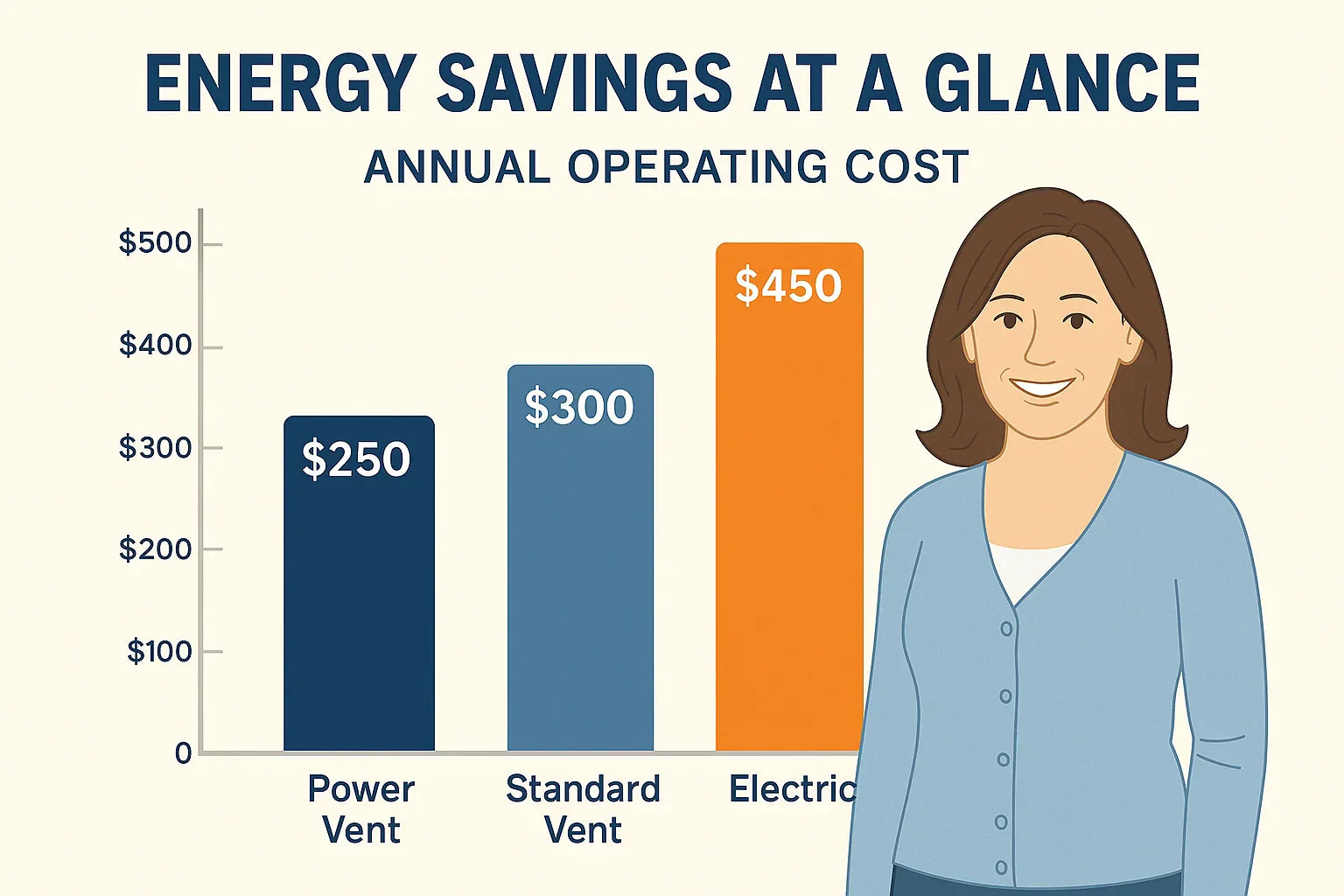👋 Samantha’s Utility Bill Wake-Up Call
When Samantha bought her home, she inherited a 10-year-old gas water heater. It worked… but every month she noticed her utility bills creeping up. At first, she thought it was just her kids taking longer showers. But when she compared her home’s bills to her neighbor’s (who had a newer power vent model), she realized something important:
👉 Not all water heaters use energy the same way.
That discovery sent Samantha on a mission to figure out: Are power vent water heaters really more efficient, and do they save enough money to justify the extra cost?
This guide takes you through what Samantha learned about efficiency ratings, real-world energy savings, and whether power vent gas water heaters are worth it.
State Proline XE Power Vent Series 50 Gallon Capacity 50,000 BTU Heating Input Tall Gas Water Heater
📊 What Does “Efficiency” Mean for Water Heaters?
Before diving into power vent models, it’s important to understand how efficiency is measured.
🔹 The Uniform Energy Factor (UEF)
-
UEF is the industry standard efficiency rating.
-
It measures how effectively a water heater converts fuel into hot water.
-
The higher the UEF, the more efficient the unit.
Typical values:
-
Standard vent gas water heaters: ~0.58–0.62 UEF
-
Power vent gas water heaters: ~0.65–0.70 UEF
-
High-efficiency condensing gas units: 0.80+ UEF
📖 Learn more about UEF from Energy.gov.
🔥 Why Are Power Vent Gas Water Heaters More Efficient?
Samantha discovered three main reasons:
-
Sealed Combustion
-
Power vent models don’t pull in heated indoor air for combustion.
-
This prevents wasting warm air (and energy) from inside your home.
-
-
Blower-Assisted Exhaust
-
The fan ensures gases exit efficiently, regardless of chimney draft.
-
No energy is lost from poor venting.
-
-
Flexible Placement = Shorter Runs
-
With PVC pipes venting directly outside, less heat escapes compared to long metal chimney runs.
-
📖 Energy Star Water Heater Guide confirms that design improvements like sealed combustion improve efficiency ratings.
💲 Operating Cost: Standard vs. Power Vent
Let’s look at Samantha’s numbers and national averages:
-
Standard Vent (50-gallon):
Annual operating cost: $290–$350 -
Power Vent (50-gallon):
Annual operating cost: $250–$310
That’s about $30–$50 in savings per year.
Over a 10-year lifespan, that’s $300–$500 saved.
📊 Example Case: Samantha’s Family of Four
-
Daily use: ~65 gallons hot water (4 showers + dishwasher + laundry).
-
Old standard vent: ~$340/year.
-
New power vent: ~$285/year.
-
Annual savings: $55.
-
Payback: ~7 years (factoring in higher upfront cost).
👉 For Samantha, the savings weren’t huge monthly, but over a decade, they made a noticeable dent in her bills.
🌍 Environmental Benefits of Power Vent Heaters
Efficiency isn’t just about money—Samantha also cared about her family’s environmental footprint.
-
Lower greenhouse gases: Less wasted fuel = fewer emissions.
-
Cleaner indoor air: Sealed combustion reduces backdraft risk.
-
Eligibility for rebates: Some Energy Star-certified power vent heaters qualify for rebates or tax credits.
📖 Check rebates in your area at the DSIRE database.
🛠️ Real-World Efficiency Factors
Efficiency ratings are helpful, but Samantha learned real-world usage matters even more.
✅ When Power Vent Models Shine
-
Multiple back-to-back showers (fast recovery prevents wasted reheating).
-
Utility closets without chimneys (flexible venting cuts heat loss).
-
Eco-conscious households seeking rebates.
⚠️ When Efficiency Gains Shrink
-
Low hot water demand households (1–2 people may not use enough to see payback).
-
High electricity rates (blower fan uses 50–100 kWh/year).
-
Short-term homeowners (if you’ll move in 3–5 years, payback may not matter).
📖 Consumer Reports on water heaters warns that lifestyle and location strongly influence payback.
⚡ The Electricity Factor: Hidden Costs
One surprise for Samantha: the blower fan needs electricity.
-
Uses about 50–75 kWh/year, depending on usage.
-
At $0.15/kWh, that’s about $8–$12/year.
-
Still less than the $30–$50 savings from gas efficiency—but worth noting.
👉 Bottom line: the electricity cost is minor, but if your utility rates are very high, it can reduce the net savings.
🔇 Efficiency vs. Noise Trade-Off
Samantha also noticed: power vent units make noise during operation.
-
The fan produces a low hum each time the heater runs.
-
Placement matters—if your utility closet is near a bedroom, you’ll notice it.
-
The noise doesn’t affect efficiency, but it can affect comfort.
📊 Comparison Chart: Efficiency at a Glance
| Feature | Standard Vent | Power Vent |
|---|---|---|
| UEF Efficiency | 0.58–0.62 | 0.65–0.70 |
| Annual Operating Cost | $290–$350 | $250–$310 |
| Annual Savings | — | $30–$50 |
| 10-Year Savings | — | $300–$500 |
| Electricity Use | None | 50–100 kWh/year |
| Noise | Silent | Fan noise |
| Rebates | Rare | Sometimes (Energy Star) |
🏠 Samantha’s Case Study: Was It Worth It?
After one year with her State ProLine XE Power Vent 50-gallon heater, Samantha compared bills:
-
Gas usage dropped by about 8%.
-
Annual utility savings: $52.
-
Family had fewer complaints about lukewarm water (fast recovery).
-
Noise was noticeable but tolerable since the unit was in the basement.
👉 For Samantha, the combination of modest savings, better safety, and peace of mind made the power vent worth it.
✅ Conclusion: Are Power Vent Heaters Efficient Enough?
Yes—but efficiency alone isn’t the only reason to buy one.
-
Power vent models are 5–10% more efficient than standard vent.
-
They save about $30–$50 per year in gas, or $300–$500 over a decade.
-
Add in rebates, safety, and placement flexibility, and they’re often worth the cost—especially for families using lots of hot water.
Samantha’s advice?
👉 If you’re replacing your water heater anyway, a power vent is a smart investment—especially if you’ll be in your home long enough to see the payback.
In the next topic we will know more about: Maintenance Guide: How to Keep Your Power Vent Water Heater Running Like New







